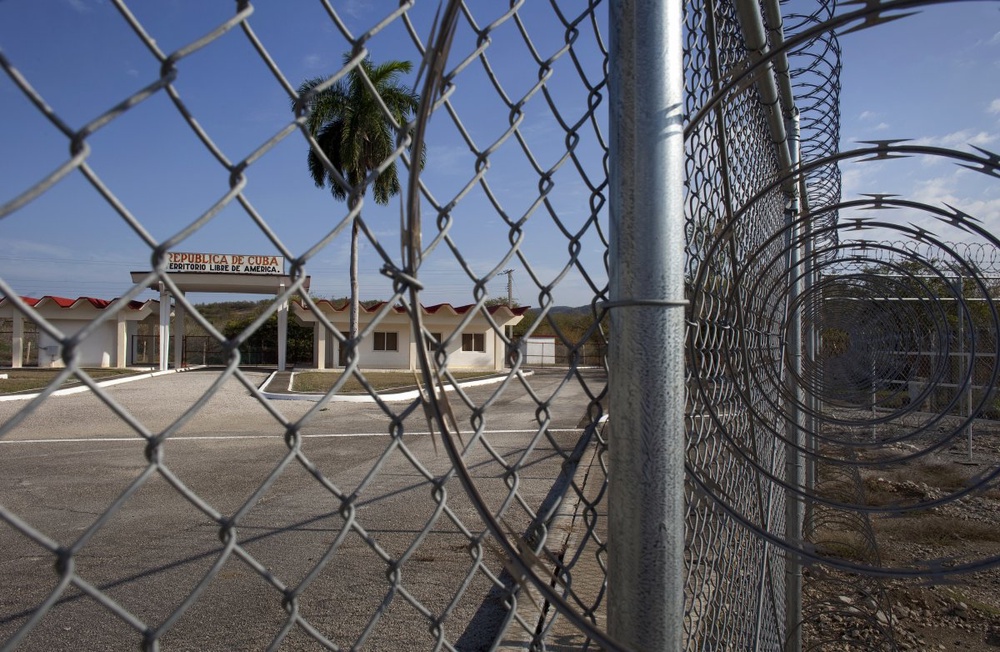
Lawyers for detainees at Guantanamo prison called for the US to show concrete steps towards closing the facility on Tuesday, citing a "humanitarian crisis" at the controversial jail, AFP reports. "The situation is dire," said lawyer Omar Farah of the Center for Constitutional Rights, who represents a Yemeni detainee, at a meeting at the Inter-American Commission on Human Rights. "Our clients may well die in Guantanamo, not because the United States is unable to transfer them but because the government is unwilling to do so," he said. He highlighted an ongoing hunger strike, entering its fifth week, by "most of the men at the prison." The strikers aim "to peacefully protest worsening prison conditions, religious provocation, and the crushing reality that after 11 years in indefinite detention, there is no end in sight," he said. Farah and other lawyers want the commission, a branch of the Organization of American States and which has the power to make recommendations to North and South American countries, to visit the prison and speak with detainees. He argued that President Barack Obama, who pledged in his first campaign that he would close the camp on his first day in the Oval Office, has been looking for "excuses" not to honor that pledge. The US government regularly invokes a component of the laws governing the military's budget, called the National Defense Authorization Act or NDAA, which forbids them from paying for the transfer of the detainees to the US or overseas. While conceding that the NDAA makes closing Guantanamo "complicated," Farah called it "grossly misleading" to claim NDAA, alone, has prevented the government from transferring or releasing the detainees. The US must offer concrete evidence of efforts to close the camp, he said, "in light of the extensive torments that indefinite detention creates for the Guantanamo prisoners and the physical risks that it imposes." "In light of the humanitarian crisis unfolding at Guantanamo, it is indefensible that the US government failed to answer the Commission's simple questions about how it plans to close the prison camp," Farahs said. Farah also cited the nine inmates who have died while in custody there, and the fact that the US has admitted it no longer has any interest in detaining around half of the prisoners. Similarly, Kristine Huskey, a lawyer for Physicians for Human Rights, emphasized the "lasting and severe psychological trauma" caused by indefinite detention. Michael Williams, a top official at the State Department -- where the office tasked for four years with closing the jail was, itself, shut down -- defended the US. Although he admitted that it has been a long time since any detainee has been transferred from the camp, he noted that "the president has very recently reiterated his intention of closing Guantanamo." "We will continue to work to accomplish transfers" of the 56 inmates designated for release, he said.





Lawyers for detainees at Guantanamo prison called for the US to show concrete steps towards closing the facility on Tuesday, citing a "humanitarian crisis" at the controversial jail,
AFP reports.
"The situation is dire," said lawyer Omar Farah of the Center for Constitutional Rights, who represents a Yemeni detainee, at a meeting at the Inter-American Commission on Human Rights.
"Our clients may well die in Guantanamo, not because the United States is unable to transfer them but because the government is unwilling to do so," he said.
He highlighted an ongoing hunger strike, entering its fifth week, by "most of the men at the prison."
The strikers aim "to peacefully protest worsening prison conditions, religious provocation, and the crushing reality that after 11 years in indefinite detention, there is no end in sight," he said.
Farah and other lawyers want the commission, a branch of the Organization of American States and which has the power to make recommendations to North and South American countries, to visit the prison and speak with detainees.
He argued that President Barack Obama, who pledged in his first campaign that he would close the camp on his first day in the Oval Office, has been looking for "excuses" not to honor that pledge.
The US government regularly invokes a component of the laws governing the military's budget, called the National Defense Authorization Act or NDAA, which forbids them from paying for the transfer of the detainees to the US or overseas.
While conceding that the NDAA makes closing Guantanamo "complicated," Farah called it "grossly misleading" to claim NDAA, alone, has prevented the government from transferring or releasing the detainees.
The US must offer concrete evidence of efforts to close the camp, he said, "in light of the extensive torments that indefinite detention creates for the Guantanamo prisoners and the physical risks that it imposes."
"In light of the humanitarian crisis unfolding at Guantanamo, it is indefensible that the US government failed to answer the Commission's simple questions about how it plans to close the prison camp," Farahs said.
Farah also cited the nine inmates who have died while in custody there, and the fact that the US has admitted it no longer has any interest in detaining around half of the prisoners.
Similarly, Kristine Huskey, a lawyer for Physicians for Human Rights, emphasized the "lasting and severe psychological trauma" caused by indefinite detention.
Michael Williams, a top official at the State Department -- where the office tasked for four years with closing the jail was, itself, shut down -- defended the US.
Although he admitted that it has been a long time since any detainee has been transferred from the camp, he noted that "the president has very recently reiterated his intention of closing Guantanamo."
"We will continue to work to accomplish transfers" of the 56 inmates designated for release, he said.
Continuation


 +7 (777) 001 44 99
+7 (777) 001 44 99















































